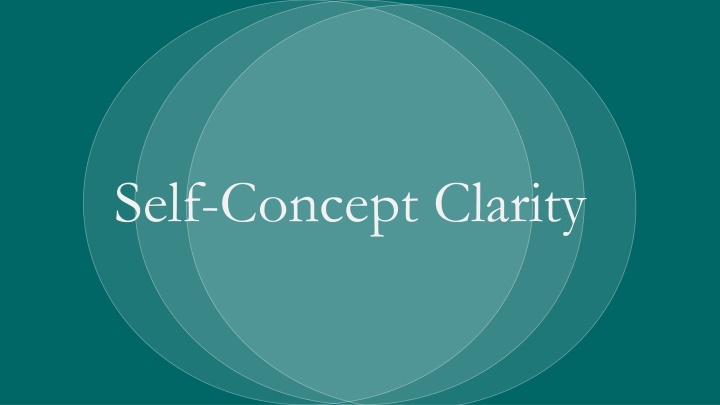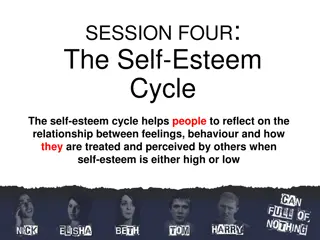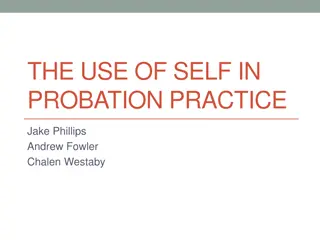
Self-Concept Clarity and Self-Esteem: A Comprehensive Overview
Explore the intricate relationship between self-concept clarity and self-esteem, examining how they influence individuals' perceptions of themselves and responses to feedback. Delve into concepts such as Threatened Egotism, Self-Verification Theory, and the impact of High Self-Esteem with Low Self-Concept Clarity. Uncover the implications of High Self-Esteem and Low Self-Concept Clarity on behavior, including narcissism and self-doubt.
Download Presentation

Please find below an Image/Link to download the presentation.
The content on the website is provided AS IS for your information and personal use only. It may not be sold, licensed, or shared on other websites without obtaining consent from the author. If you encounter any issues during the download, it is possible that the publisher has removed the file from their server.
You are allowed to download the files provided on this website for personal or commercial use, subject to the condition that they are used lawfully. All files are the property of their respective owners.
The content on the website is provided AS IS for your information and personal use only. It may not be sold, licensed, or shared on other websites without obtaining consent from the author.
E N D
Presentation Transcript
Self-Esteem: How you feel about yourself (+/-) Self-Concept Clarity (SCC): How sure you are about those evaluations
Self-Concept Clarity - People vary in the degree to which they are sure what they are like. - Traits (personality, conscientiousness, attractiveness, etc.) Values (political orientation, achievement, altruism, etc.) Skills (artistic, musicality, athleticism, intelligence, etc.)
Self-Concept Clarity & Self-Esteem High Self-Esteem, High Self-Concept Clarity Low Self-Esteem, High Self-Concept Clarity Low Self-Esteem, Low Self-Concept Clarity High Self-Esteem, Low Self-Concept Clarity Threatened Egotism
Self Esteem vs Self Coherence Self-Verification Theory: People respond differently to others depending on how they feel about themselves. This is especially true for those with Threatened Egotism (high SE, low SCC). People want to be seen (a) positively and (b) accurately. Not a problem for those with symmetrical self-esteem and self-concept clarity. Those with threatened egotism may encounter problems: positive feedback is inaccurate, but negative feedback is threatening.
Self-Verification and Responses to Feedback Controlled vs Automatic Processing: Feeling (automatic) vs Thinking (controlled) Those high in SE but low in SCC: Automatic/Immediate Response: Initially accept positive feedback Controlled/Delayed Response: Eventually correct and dismiss positive feedback
For an overview of Self-Verification Theory CLICK HERE
High SE and Low SCC: Continued This Hollow Self-Esteem is the basis for dysfunctional though and behavior. Narcissism grandiosity, bragging, putting down and blaming others, projecting weaknesses onto others, not taking responsibility for actions, etc... Can be attributed to differences in implicit and explicit self esteem self doubt.
Predictors and Consequences of Narcissism? Consequences: Predictors: Intolerance to criticism Child-rearing: Potential for aggression False praise Low resilience Over-protection Low impulse control
Self-Defeating Behavior Why do we sometimes act against our own self-interest? At times we Avoid opportunities of success Increase our likelihood of failure Do things we know we shouldn t . Why?
Self-Handicapping An action or choice of performance setting that enhances the opportunity to externalize (excuse) failure and internalize (take credit for) success Predictors: Uncertainty in control over personal outcomes Feeling that your actions reflect your competence When you want to maintain a positive self-image
Sabotaging your own likelihood for success Passing up practicing opportunities Partying the night before an exam Creating an obstacle to good performance Running in worn-down shoes Choosing to perform an impossible task Choosing a heavy college course-load Substance abuse Alcohol & drugs
CLICK HERE for Examples of Self Handicapping
Gender Differences in Self-Handicapping Males: Females: Overall more self- + Test anxiety +Physical symptoms handicapping +Performance-inhibiting drugs Lower efforts/practice
Ego Defense Mechanisms Ignore and distort incoming information Escaping self-awareness with substances Repression and thought depression Projection onto others






















